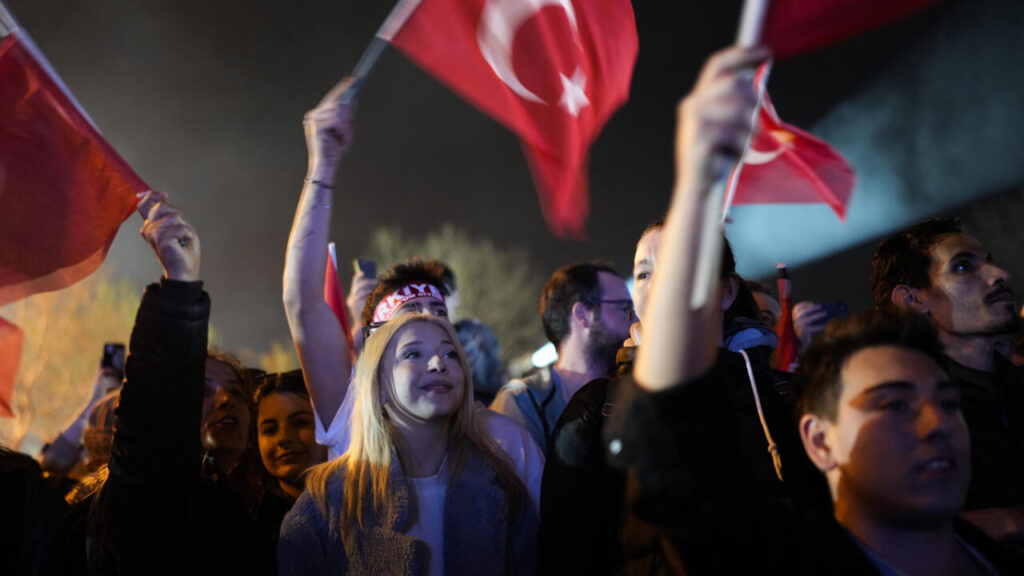Turkey’s local elections on Sunday dealt President Recep Tayyip Erdogan and his ruling AKP party the biggest blow in more than 20 years.
Publication date: 01/04/2024 – 11:13
3 minutes
Here are five things you need to know about the poll, which was a fiasco for the country’s veteran leader.
More than a local poll
By focusing his efforts on campaigning for his party’s mayoral candidates, President Erdoğan made the election a national sensation, effectively making it a referendum on him and his party.
This was especially true in Istanbul, the country’s metropolis and economic powerhouse, where Erdogan was keen to get his own political start and wrest it back from opposition forces.
The voters’ answer was clear: not only did the ruling party fail to retake control of Istanbul and the capital, Ankara, from the opposition, it also lost ground in other major cities across the country, including in the conservative Anatolian regions where the AKP was seen as a stronghold.
Berg Esen, a political scientist at Sabanci University, described the election as “the biggest electoral defeat in President Erdoğan’s career,” in which the main opposition party, the CHP, recorded “its best result since 1977.”

04:45
economic hardship
The elections took place against a bleak economic backdrop of 67 percent inflation and a significant devaluation of the lira, which had a severe impact on the lives of most Turks.
Ali Faik Demir, a political scientist at Galatasaray University, told AFP: “When Turkish people vote, the situation in the kitchen and at the table changes their voting tendencies.”
The biggest changes in voting occur when people can’t afford to live or eat.
istanbul
Erman Bakirsi, a pollster at Konda Research and Consultancy, recalled that Erdogan once said, “Whoever controls Istanbul will control Turkey.”
This mythical city, which straddles Europe and Asia, is Turkey’s economic powerhouse, accounting for 30 percent of the country’s gross domestic product (GDP). Her 16 million inhabitants account for almost one-fifth of the national population.
“It’s not easy to run Istanbul, a city with more people than 20 countries in the European Union,” said Aylin Umbar Noy, a professor at Istanbul’s Halik University. “This is a hub, a commercial, financial and cultural center, a nation,” she said, adding that “the people who run this city and prove themselves in it” have a path to a national platform. He added as he opened it.
President Erdoğan embodies this. He grew up in Istanbul and became mayor in 1994, launching a career that elevated him to the country’s top post.
President Erdoğan’s twilight?
Erdogan has been at the helm of Turkey since becoming prime minister in 2003. He was elected president in 2014 and has since been re-elected twice, most recently in 2023.
During his time at the top, he weathered many storms, including massive anti-government protests in 2013 that engulfed much of the country and an attempted coup in 2016.
Some analysts had already suggested that the losses of Istanbul and the capital Ankara to the opposition in the last local polls in 2019 signaled a turning point in the fortunes of President Erdogan and his party. Some observers say the massive blow dealt could be fatal.
Even before Sunday’s vote, Erdogan had indicated that the 2023 election, in which he was re-elected with 52% of the vote, would be his last.
Bayram Balsi, a researcher at France’s Poly Sciences University, says this possibility is now almost certain.
“He has the ability to surprise and make career-ending decisions,” he said. It will be “a way to go out in style while staying true to his Islamic vision and religious belief that nothing on this earth is permanent.”
President Imamour?
With another decisive victory over President Recep Tayyip Erdogan’s ruling party, Istanbul Mayor Ekrem Imamoglu has cemented his leadership role within Turkey’s notorious opposition.
He has height, popularity, media acumen, and above all, ambition.
In the run-up to Sunday’s vote, Erdogan reinforced his message that İmamoğlu (who he rarely mentioned by name) was a “part-time mayor” obsessed with presidential ambitions.
Similar accusations have been made by opponents within his own CHP party.
But since his first victory in 2019, he has faced legal troubles that could damage his political future.
In 2023, an Istanbul court ruled that Imamoglu’s comments to reporters that the city’s election officials were “stupid” amounted to defamation, and sentenced him to nearly three years in prison.
This prohibited him from participating in politics during his sentence.
Mr. Imamoğlu appealed. This meant that he continued to serve as mayor, leaving his fate in the hands of a judge who conducted a fair inquiry.
It is unclear how the case against him will develop ahead of Turkey’s next presidential election, scheduled for 2028.
(AFP)


